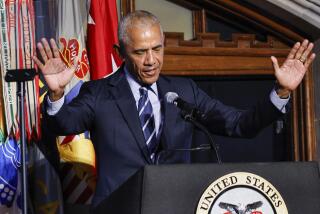Obama’s travels may give voters jet lag
- Share via
WASHINGTON — When Americans learned that unemployment had reached its highest level in a quarter of a century last week, President Obama was midway through a star turn in Europe. And next week, with barely time to pack fresh shirts and refuel Air Force One, he’s off again -- first to Mexico, then to a summit meeting in the Caribbean.
It’s the sort of thing that can get a political leader into trouble, jetting out of town while the home front suffers.
Obama strategists see his foreign travel as satisfying another domestic political need -- the longing of many Americans to view their president as a global leader commanding respect for himself and his country.
But even some of Obama’s supporters are nervous about the timing of the trips. They worry that meetings with the queen and other bits of stagecraft may suggest a detachment from the concerns of ordinary people.
James Carville, an architect of former President Clinton’s victory in 1992, said his guess was that the weeklong, multi-country visit would be a “neutral” to “a slight positive” for Obama but could turn out to be a mistake.
Carville said people had been calling White House aides to deliver the message that “foreign trips aren’t what they used to be. We got a recession back here!”
One former Obama campaign advisor said in an interview: “There’s a delicacy about the optics. Do they [the public] want to see him speaking before the Turkish parliament, or would they rather be seeing him conferring with the Treasury secretary?”
Obama’s team is moving to stave off any potential backlash. An event to highlight the number of homeowners who have benefited from refinancing their mortgages is planned for next week -- before Obama leaves the country again.
The sequence has a parallel in the 2008 campaign. As Obama left for a nine-day foreign trip last summer capped by a speech to 200,000 people in Berlin, his advisors were mindful that the time away would bring the candidate a short-term drop in the polls.
They compensated with a relentless focus on economic issues when Obama returned, including a meeting with top economic advisors including former Treasury Secretary Robert E. Rubin.
Research done during the campaign offered some reassurance that Americans would be receptive to the trip that just ended. Surveys by the Obama team showed that voters wanted to see the nation’s international stature improved.
“During the campaign it was absolutely something we heard regularly,” said David Binder, who conducts focus groups for the Obama White House. “The imagery of the president being well received . . . is something that makes Americans feel proud again -- that we have a leader who is well liked and respected throughout the world.”
Democratic Pennsylvania Gov. Edward G. Rendell said of the trip: “He looked like a leader, he acted like a leader, and he was a leader. Whether there were any great substantive accomplishments remains to be seen. But the perception of him moving in the community of nations was great for the country.”
Obama also offered up another argument: American jobs may depend on better international conditions.
In a news conference at the G-20 economic summit in London, he was asked how his participation might help families struggling back home.
Obama replied that for American companies to avoid layoffs, world markets must be healthy. He used the example of Caterpillar, a company in his home state of Illinois.
“As a consequence of the world recession, as a consequence of the contagion from the financial markets debilitating the economies elsewhere, Caterpillar is now in very bad shape,” Obama said. “So if we want to get Caterpillar back on its feet, if we want to get all those export companies back on their feet so that they are hiring, putting people back to work, putting money in people’s pockets, we’ve got to make sure that the global economy as a whole is successful.”
Carville predicted that in their post-trip assessment, Obama’s advisors would talk up the economic benefits of the journey, more so than any diplomatic initiatives.
“The spin will be that we got real stuff done here, real economic stuff,” Carville said. “You watch when they talk about the trip, they’ll say we did repair some damage in the Islamic world, but . . . they’ll have a tendency to play down their foreign policy achievements and play up the other things.”
It’s not an easy case to make, some Obama loyalists concede. The economic downturn has created so much anxiety, the president may be hard pressed to make the case that a week spent abroad would provide concrete relief.
The former campaign advisor said: “Because there’s such a focus on the economy and it’s at such a crisis stage where people are desperate to see solutions and movement on it, he’s in a delicate place. It’s a very delicate time to be seen as doing things overseas.”
--
More to Read
Get the L.A. Times Politics newsletter
Deeply reported insights into legislation, politics and policy from Sacramento, Washington and beyond. In your inbox three times per week.
You may occasionally receive promotional content from the Los Angeles Times.










